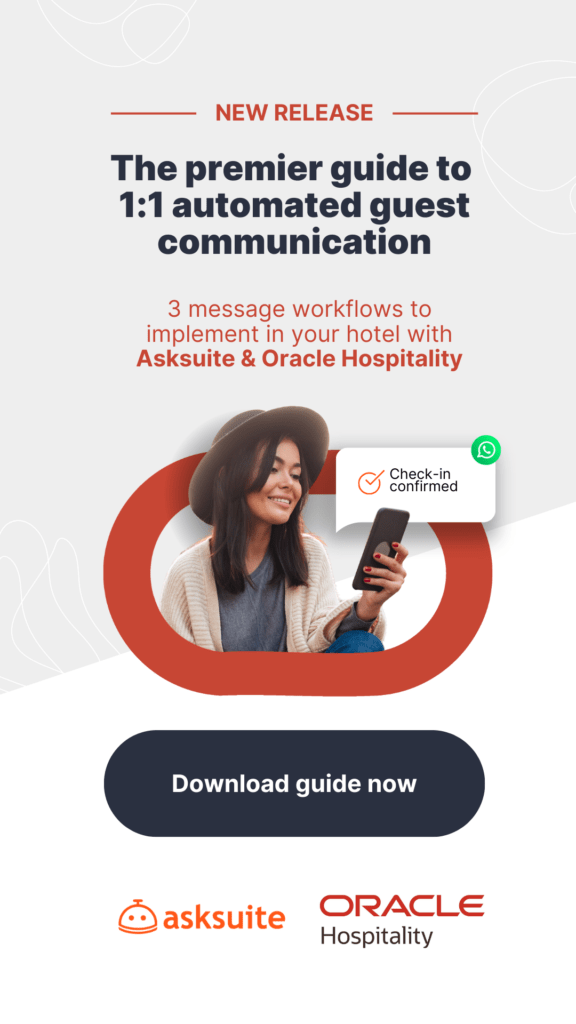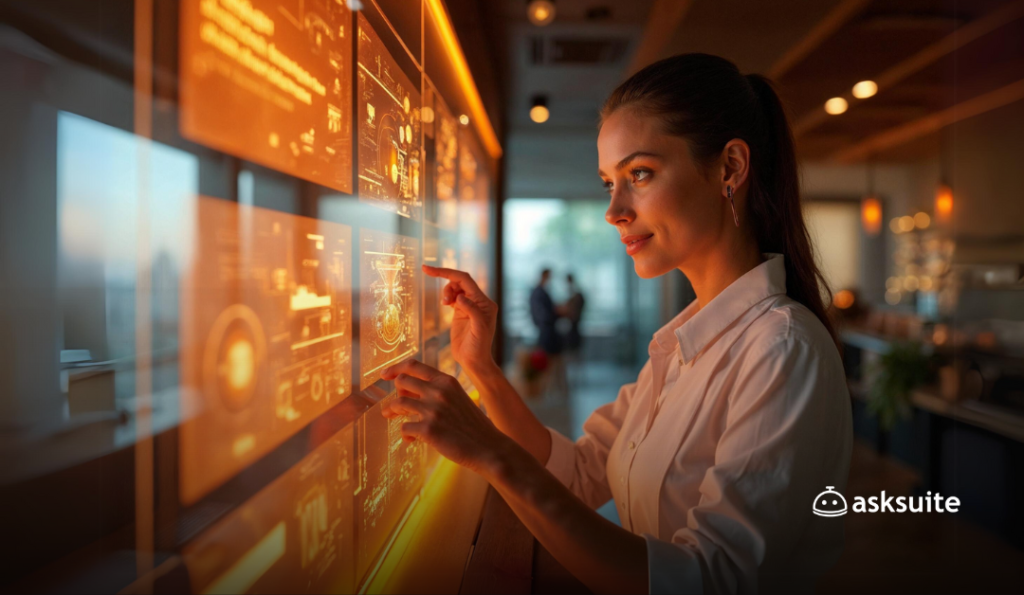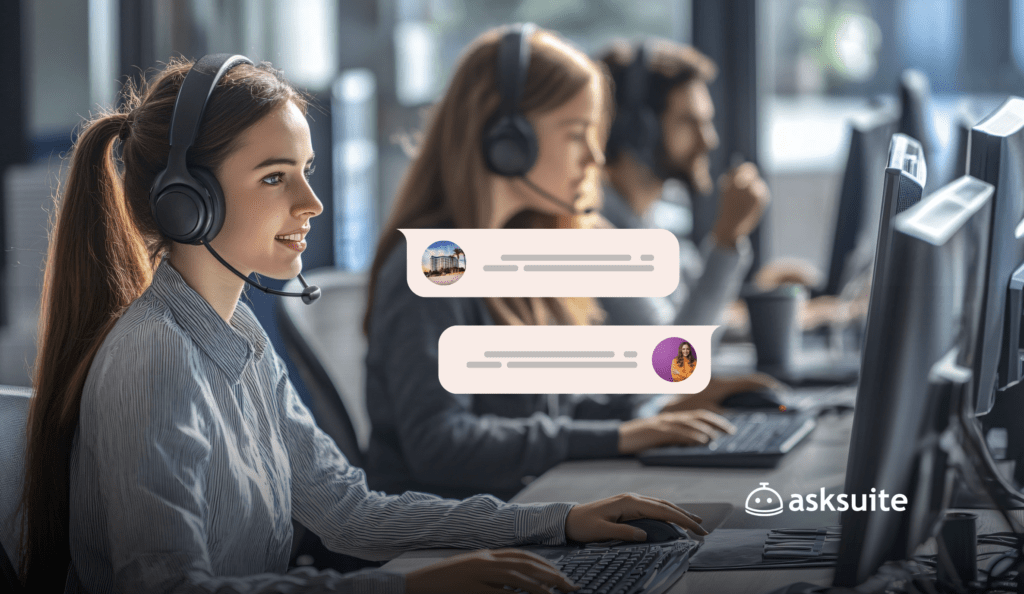Guest service can not be just a slogan or something you say just because it’s trendy now. It must be the hotel’s purpose. Every person of the staff and every technology must have one goal: to make guests satisfied so they become loyal to your brand. Creating a loyalty bond really pays off!
That is why this Ask & Talk focuses on how hotel technologies can help you improve your guest experience. There are many hotel techs on the market and you need to know what each one can do and what your guests actually want.

To help us understand this better, we invited the Chief Operating Officer and co-founder of Volo Hospitality Systems, Benjamin Londa, for a talk. In this short, yet insightful, interview, he shares his experience working in the American hotel industry as an in-room tablet solution provider.
Let’s check what he has to say!
It’s all about the guest service. Is technology an ally or an enemy in the guest’s journey?
B.L. – It is incredibly beneficial for hotels to adapt as technology does. For an industry that is slow to change, it’s an easy way to position yourself ahead of the pack by keeping current with all technology. Technology is a must – guests want aspects of their experience to mimic how they live their lives. The more technology your rooms provide to guests that are like what they might have at home, their experience skyrockets.

What about the hotel staff? Can technology increase the staff’s productivity?
B.L.- From task automation to reducing phone time, technology increases staff productivity without question – which in turn increases the property’s revenue. The in-room tablet solution, for instance, allows for more precise delivery – the potential of getting an order wrong from a phone call is gone.
It also provides metrics on staff response time so there is accountability for the staff members. The in-room technology answers many questions that a guest might otherwise need to contact a staff member for a resolution. Technology needs to stay current, otherwise, hotels can run the risk of decreasing productivity in addition to blemish their reputation.
Guest service, direct bookings, revenue management. In your opinion, what are the big challenges hoteliers face today?
B.L. -Keeping guests engaged and loyal. Most hotels don’t provide enough “wow factors” on-site as there are around town. Of course, vacationers aren’t there to just see the hotel. However, if hotels can provide more than just a place to sleep, loyalty would certainly increase.
Hoteliers also face a huge challenge when it comes to the personal touch and technology’s play into this: “Do we offer an app the guest can download? Or should we invest in a digital guide within our televisions? Do guests want to have tablets in the room? What about in-room voice system?”
Everyone seems to have a different opinion about what’s the right way to do this, and it seems that no one puts themselves in the guest’s shoes when they make these decisions.
I am constantly baffled whenever a hotel or brand releases an app for the guest to download. You’re trying to create a wonderful guest experience, which in my mind means that all the amenities and personal touches and services are awaiting the guest on arrival. And stay there when the guest leaves. No one wants a hundred different hotel apps on their personal phones.
Convenience seems to be the keyword for the traveler’s experience. What does it mean “to be convenient” from the guest’s point of view? And from the hotelier’s?
B.L. – As I said above – I don’t find it convenient to ask the guest to download an app, for example. I believe guests see convenience as everything they might need is in the room when they arrive. They don’t need to do anything out of the ordinary, and nothing follows them home – like an app!
In hotelier’s minds these days, I believe convenience means seamless service – from agent-less check-in and keyless entry to providing the comforts of home (access to personal streaming services) within the room.
- Note from the author: Chatbots and omnichannel technology can make the guest experience seamless even before the arrival. Click here to learn more about our product specially designed for the best online guest experience in pre-stay.

Data is great for personalization of the guest service. What should hoteliers consider in terms of data security?
B.L. – It’s a tricky line to walk with the issue of security. Systems like ours, Volo, can integrate with the property’s PMS or POS system, to provide personalization and direct purchasing from the tablet to the guest portfolio. Fortunately, with the way we built our product and with the hardware we use, there is no chance for a data breach. Guest information is never stored in our system and the security used in our devices’ operating system is unsurpassed.
Nevertheless, integrations like these still come with a risk – we call it “the hamburger example”. If our system is integrated with your POS, you’re essentially wanting to remove the human touch that exists between the guest order and the charge to the portfolio. Let’s say that a child is playing around and orders 100 hamburgers this way, you’ve been billed for 100 hamburgers – there’s not a staff member there to question that kind of order, preventing a mishap.
If you allow guests to log in to their personal accounts for streaming services via the SmartTV, per se, and you don’t have some sort of automated cache-clearing set up, you run the risk of the guest not logging out and their accounts could be compromised.
Hotels need to strive for a guest experience that provides convenience and personalization but be conscious of and smart about the risks.
How can technology help communication between customers and hotel staff?
B.L. -The technological advances of mobile phones and texting have done a good job of changing the ways people communicate, for better or worse. Most people prefer to text than call and to order online rather than place an order over the phone.
Hotels should follow suit and enable guest/staff communication to be done in other ways than in person or the in-room telephone. Communication should also be direct and instantaneous, as well – no waiting in line or on hold and no busy signals.
Is it possible to stay competitive and not invest in technology?
B.L. – If we are referring to guest-facing or room technology, I think in certain cases, yes – there is an entire industry devoted to a tech-free experience. Unplugging. Certainly, there is importance and validation for that sphere.
But if you think those properties’ front of the house follows the same guidelines, you’d be sorely mistaken! For the vast majority, no, I don’t believe it is possible to stay competitive if you’re not investing in technology. There have been many studies that prove that wireless service is the most important thing for guests at the property.
In addition to in-room & guest-facing technology (such as in-room tablets, chatbots, personal streaming service access, wi-fi with a strong signal, etc.), hotels must invest in advanced back-end technology, which can increase revenue and staff productivity by streamlining their operations and providing metrics on which areas need improvement.
About Benjamin Londa: Benjamin Londa is the Chief Operating Officer and co-founder of Volo Hospitality Systems, an in-room tablet provider for the hospitality and healthcare markets. Volo’s innovative system has proven to increase the overall guest experience, increase staff productivity all while ultimately being a revenue generator and not a cost to the property.
If you want to know how chatbot technology can improve guest service and boost your hotel revenue, leave your info below and we will contact you shortly!




